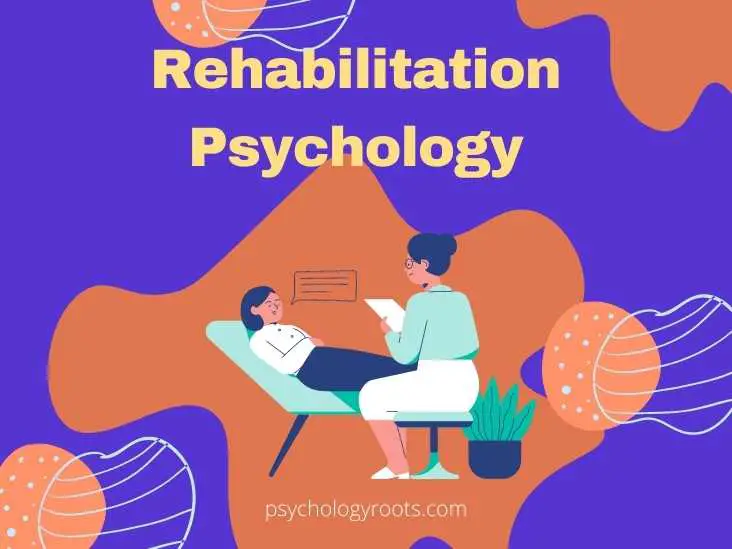Table of Contents
Rehabilitation Psychology – Definition, Implementation, and qualification
Here in this post, we are discussing “Rehabilitation Psychology – Definition, Implementation, and qualification”. You can read more about psychology-related material on our website. Keep visiting Psychology Roots.
The activities you used to be able to accomplish could no longer be possible if you have a handicap because of an accident or long-term illness. It might have a negative impact on your emotional well-being or mental well-being.
Counseling from a rehabilitation psychologist, for example, might be beneficial. When you have a debilitating injury or condition, they can educate you on how to deal with the psychological, social, and work-related difficulties you may encounter. Your life’s quality may be improved as a result of the talents you acquire.

Rehabilitation Psychology
Rehabilitation psychology may encourage you, boost your self-esteem, raise your independence, and help you adapt to the physical, emotional, and mental health changes that you’re experiencing. As a patient, you will get a personalized treatment plan from psychologists.
Helping those who suffer from a broad range of health conditions, such as:
- A brain injury
- Stroke
- Damage to the spinal cord
- Loss of a limb
- Suffocation
- Chronic ailment
- Disorders of the nervous system
- Cancer
- AIDS
- Disabilities of the mind
- Disorders on the autistic spectrum
- Alcoholism and other drug abuse disorders
- Deafness
- Blindness
- Accidental burns and deformities
- Cultural, educational, and/or other disadvantages may exacerbate existing issues.
In addition, they are trained to detect and treat disorders such as:
- PTSD
- Anxiety \sDepression
- Disorder of somatic symptoms (a condition that brings on physical symptoms due to psychological distress)
How do Rehabilitation Psychologists Work?
Your cognitive abilities and psychological well-being are the first things they examine. Then, based on your specific requirements, they may provide you with services such as:
- There is either individual or group treatment available (including counseling and talk therapy)
- To improve your thinking skills and compensate for any deficiencies, you need to practice (also called cognitive remediation)
- Helping you gain control of your conduct is possible with these strategies.
- Assistive technology and technological tips to help you get the most out of it
- Modifications to your way of life that may improve your health
When developing your treatment plan, the rehab psychologist will take your choices, requirements, and resources into account. They must also show consideration for the following:
- Your ethnicity or race
- Language Sexual orientation and/or gender expression
- A person’s sexuality
- An online community
- What kind of neighborhood do you reside in? (based on things like your education level, income, and job)
You may learn from your rehabilitation psychologist how to best assist yourself as you transition to your new normal and how to help those closest to you adjust as well. Other key persons in your life, such as professors, employers or coworkers, religious leaders, or friends might also benefit from their services.
Depending on your needs, they may collaborate with other professionals on your health care team, such as:
- Rehabilitative and physical therapists (physiatrists)
- A speech therapist
- Occupation-focused therapists
- Therapists of the body
- Your rehab psychologist’s goal is to help you feel your best while you go about your daily activities, socialize, go to work or school, and participate in activities you like with the aid of your team.
Who works as Rehabilitation Psychologist?
They must have a Ph.D. in psychology to accomplish this. Pre- and postdoctoral training at health care facilities is also a requirement for becoming a doctor.
In order to provide therapeutic services, rehabilitation psychologists must be licensed in the state or province where they work.
Rehab Psychiatrists might be difficult to find. These experts may be found in a wide range of locations, including:
- Healthcare facilities, such as hospitals and clinics
- Units or institutions that provide inpatient and outpatient physical rehabilitation
- Long-term care and assisted living facilities
- Some doctors’ offices have specialized clinics (like ones for pain and cardiac rehab)
- Helping organizations that serve persons with certain impairments or long-term health issues.
How Many Sessions Are Necessary for You?
Everyone is an individual. A general estimate is impossible since rehabilitation psychologists deal with a wide variety of impairments and mental health issues. As your requirements change, a psychologist may adapt your therapy plan to suit your evolving situation.
Summary
Counseling from a rehabilitation psychologist can help you deal with physical, emotional, and mental health problems. Psychologists are trained to help those who suffer from a wide range of health conditions, such as stroke, brain injuries, and other injuries or illnesses. Rehabilitation psychology may encourage you, boost your self-esteem and raise your independence. You may learn from your rehabilitation psychologist how to best assist yourself as you transition to a new normal. Other key persons in your life, such as professors, employers or coworkers, religious leaders, or friends might also benefit from their services. The American Board of Professional Psychology maintains a directory of board-certified rehab psychologists.
Help Us Improve This Article
Have you discovered an inaccuracy? We put out great effort to give accurate and scientifically trustworthy information to our readers. Please notify us if you discover any typographical or grammatical errors.
Make a comment. We acknowledge and appreciate your efforts.
If you have any scale or any material related to psychology kindly share it with us at psychologyroots@gmail.com. We help others on behalf of you.